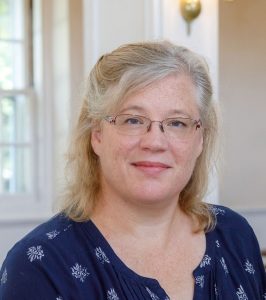 I recently joined the UU Class Conversations Steering Committee. I am currently the Church Administrator and Membership Coordinator at First Parish in Framingham UU. My career has been in nonprofit administration, starting back in 1992 at the AIDS Action Committee in Boston. I also facilitate the Diversity and Equity Exploration Team at the congregation, which grew out of years of regular discussion groups, and I felt was long overdue. The group successfully led a campaign for the congregation to adopt the 8th Principle and have struggled figuring out how to meet people where they are at and move them further in their understanding of racism and systemic oppression. We’ve led book discussions, movie discussions, article discussions and trained ourselves for a Listening Project, and became trainers for active bystanders.
I recently joined the UU Class Conversations Steering Committee. I am currently the Church Administrator and Membership Coordinator at First Parish in Framingham UU. My career has been in nonprofit administration, starting back in 1992 at the AIDS Action Committee in Boston. I also facilitate the Diversity and Equity Exploration Team at the congregation, which grew out of years of regular discussion groups, and I felt was long overdue. The group successfully led a campaign for the congregation to adopt the 8th Principle and have struggled figuring out how to meet people where they are at and move them further in their understanding of racism and systemic oppression. We’ve led book discussions, movie discussions, article discussions and trained ourselves for a Listening Project, and became trainers for active bystanders.
I attended two UU Class Conversation workshops at First Parish in Framingham. I had already been wrestling with understanding how class functions in the country and where I fall in the class hierarchy, so I found it tremendously helpful to have a way to get a handle on it. The first workshop helped me figure out where I fell in the class hierarchy.
I started out thinking class was primarily about money but knew that wasn’t all of it. I have a master’s degree in public administration but have never had a high salary. My husband, on the other hand, did not graduate from college and earns twice what I do. I was raised with middle class values and expectations, and had privileged grandparents and great grandparents. My family background includes people in poverty, working class, middle class and even some very wealthy.
Because some family members started out their life working class and then worked their way up, I was confused as to what class they were. I was surprised to find that I have had a lot of class privileges, even though my immediate family has never been wealthy. My father’s side of the family had several generations of college graduates and professionals, my father’s mother came from what would be called the owning class. Both my parents are college graduates, and high expectation for education.
My mother’s foster family is working class and poor and were on welfare when they took my mother and I in when my parents split up. I learned what it felt like to go to the school bus stop and have people think less of you because the house you live in is not in great shape. I learned about people whose lives were suddenly upended because they were laid off. I learned about people who were focusing on enjoying the present rather than always living for the future. It was a short period of my life but it made an impression.
Later on, I got a scholarship to go to a private high school. Then I saw people with much more privilege, who laughed at me for walking to school, who dressed in ways I could never keep up with and I developed a deep sense of resentment. My stepfather’s family was in the working class, and my grandmother did not approve of him exactly because of his farm background, even though her family had modest beginnings. My husband’s family is working class. I quickly learned that at family gatherings people did not talk about their work, they talk about sports, food, hobbies and they play games. And if they talked about work, it was usually just to vent.
When I started attending First Parish in Framingham around 2010, I read that the average pledge was $1,200. That was way beyond what I expected or could afford. I interpreted that to mean I could not become a member. Eventually—actually during my job interview—I was told that you didn’t have to give that much. In my role as Membership Coordinator, I made sure never to scare anyone away because of their financial circumstances.
The Canvass Committee can get into great detail about it all, but I always say that while we expect members share their time, talent and treasure, that the amount of any those is different for different people, or at different stages of their life. As I have been learning from UU conversations in the second workshop and on the website and book, there are many other areas that congregations need to take stock of and change what is exclusionary.
When cofounder Denise Moorehead asked me to join the Steering Committee, I wanted to be able to use my skills and knowledge to help make some real change in the world, beyond the small pond I am in. I offer my curiosity and empathy, along with my knowledge of a UU congregation.
